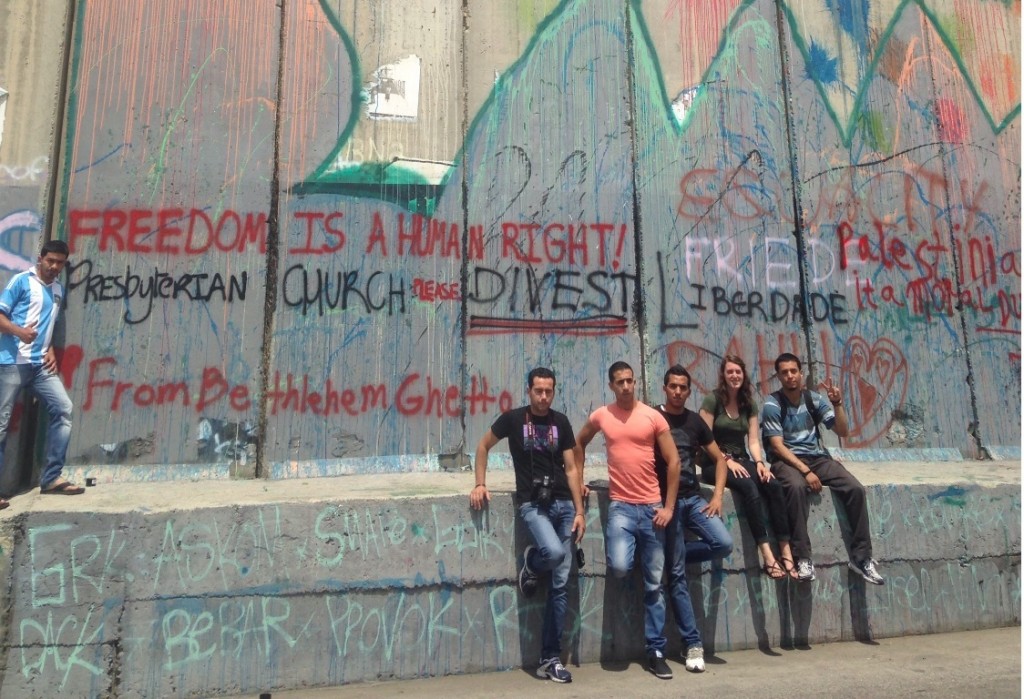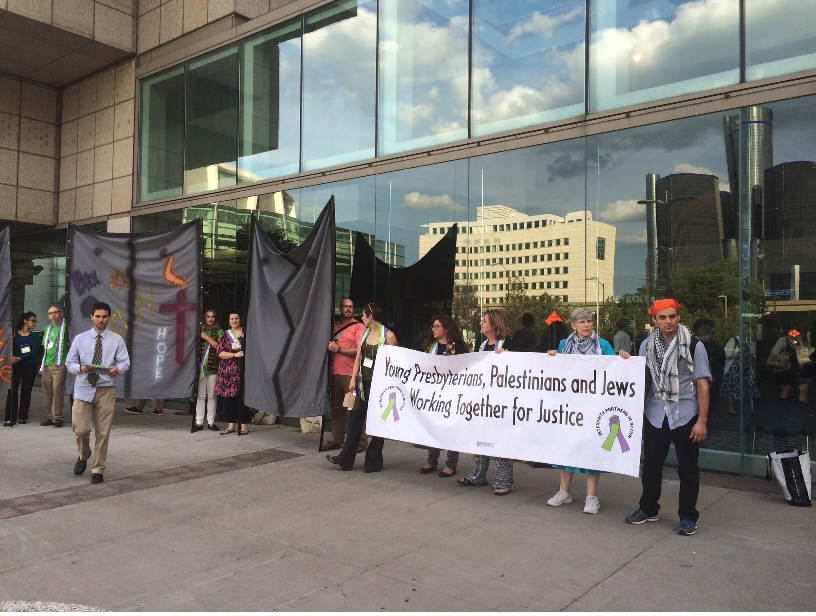On Taking a Stand – Rev. J. Mark Davidson and Rev. Ron Shive
It is occasionally said that Christian peacemaking in Israel-Palestine is best served by not choosing sides. According to this approach, Christian peacemakers should preserve Switzerland-like neutrality, the better to function as trusted intermediaries in the search for common ground. Hence, advocacy work on ending the Israeli occupation of Palestinian land is ill-advised, because it is perceived as choosing the side of the Palestinians against the Israelis. Similarly, boycott and divestment campaigns are viewed as problematic, again because they are perceived as “choosing sides.”
On the face of it, not choosing sides seems like a welcome change. In a time when church and society are riven with partisanship and polarization, and the Israeli-Palestinian conflict seems hopelessly intractable, perhaps we contribute to peace best by not choosing “a dog in the fight.” Not choosing sides appears to strike a pastoral and even-handed tone. It seems to offer a way to de-escalate the tension. Without question, there are situations in which side-choosing means shutting down on one side in favor of the other and becoming a blind, complexity-denying advocate for one side only. Moreover, are not the followers of Christ called to value the life of every child of God? That said, we believe strongly that this notion that Christian peacemaking in Israel-Palestine requires neutrality is deeply flawed and timid and cannot deliver the peace it promises.

We see the matter quite differently. First of all, the notion of American citizens claiming neutrality in Israel-Palestine is pure fantasy. We’ve already taken the side of Israel: over $100 billion in military aid since 1967 and billions more promised through 2030, blank-check diplomatic immunity at the United Nations, a compliant media that privileges Israeli viewpoints and dehumanizes Palestinians. Our tax dollars have footed the bill for the recent slaughter in Gaza – the worst destruction the Red Cross has ever seen. Our tax-supported hi-tech weaponry has created hundreds of orphans and widows and shattered families, destroyed mosques and hospitals and thousands of homes and plunged Gazans into deeper darkness and misery. Without a second thought or any real sign of remorse, our military leaders rushed replacement weapons to replenish Israel’s arsenal.
Second, even if neutrality were possible, it would be immoral. When there is a clear injustice, Christians must stand against it and work to end it. People of goodwill all across the spectrum acknowledge that the Israeli occupation of Palestinian land and the Israeli-only settlements, which are continually being built on that same land, are obstacles to peace. The occupation is wrong, it is an injustice, it is a violation of international law, and Christians must stand against it and work to end it. Taking a stand against the occupation and the settlements or the siege and recent brutality against the people of Gaza does not mean “choosing sides” against Israel or the Jewish people. It takes the side of justice against injustice. As Desmond Tutu has said, “If you are neutral in situations of injustice, you have chosen the side of the oppressor. If an elephant has its foot on the tail of a mouse and you say that you are neutral, the mouse will not appreciate your neutrality.”
Third, Christian peacemaking must engage the work of justice. As Pope John Paul II said, “If you want peace, work for justice.” This dictum is nowhere more relevant than in Israel-Palestine. Not surprisingly, advocates of neutrality omit justice. Justice work involves making judgments about concrete realities, about who has been wronged and who is responsible, and setting things right. As Christians passionate about peace, we cannot afford to ignore the injustices done to the Palestinians, going back to the Nakba*, the dispossession and ethnic cleansing of 750,000 Palestinians from their homes and their land in 1947-48. These unmitigated grievances, indeed the ongoing Nakba, are the engine of their resistance. Like any subjugated people, Palestinians will continue to resist Israeli rule, predominantly in non-violent ways but also through armed resistance, until their demands for justice and self-determination are satisfied. In the words of Palestinian poet Mahmoud Darwish, “In spite of my handcuffs, I have a million nightingales on the branches of my heart singing a song of liberation.” Peacemaking that avoids the challenging work of justice is doomed to fail.
To grasp the folly of “not choosing sides,” it may be helpful to gain some critical distance from the Israeli-Palestinian crucible and apply the neutral and conflict-avoidant approach to another moral issue, for example, the issue of slavery. Naturally, slaveholders felt threatened by abolitionists; an end to slavery would mean the collapse of the plantation economy and their cherished interests. One wonders: would the advocates of neutrality have counseled abolitionists to refrain from denouncing slavery as a moral evil because it would increase slaveholders’ sense of threat and fear? Yet the verdict of history tells us that slaveholders were on the wrong side of history, the egregious practice of owning other human beings and depriving them of their freedom, dignity, and self-determination had to end, and that the abolitionists were right to take a stand.

Both of us have been active in Christian peacemaking in Israel-Palestine for decades, educating ourselves on the issues, traveling to the region, meeting with inspiring Israeli and Palestinian peacemakers, and working with Christian, Jewish, and Muslim organizations dedicated to a just and lasting peace in the Middle East. It has long been our practice to hold both Israelis and Palestinians in prayer, to honor their distinct narratives, to appreciate that both peoples have legitimate grievances and aspirations, to refuse to “choose sides” in the sense of favoring one people and disfavoring another. In this sense, it is right not to choose sides.
However, if we fail to take concrete action to shift the dynamics of the profoundly unjust status quo in Israel-Palestine, such as boycotts, divestment, and sanctions, we will have failed as peacemakers. It is not Israel that is being oppressed, not its boys and young men who are being routinely arrested, held indefinitely in administrative detention, tortured, threatened with sexual abuse, and their sisters and mothers threatened with rape; it is not Israel’s infrastructure, its power plants, its houses of worship, its water treatment plants, its hospitals, schools, and rehabilitation clinics that are being bombed; it is not Israel’s natural resources, its land, aquifers, fisheries, and natural gas reserves that are being stolen from them; it is not Israel’s land that is being illegally colonized.
Among the greatest gifts of peace comes the day when conflicted parties finally break loose from the oppressor-oppressed locked embrace that has held them both captive and stunted their humanity. On that day, adversaries finally interrupt the cycle of violence, clear their eyes to begin to see each other no longer as mortal enemies but as fellow human beings, and start together forging a life without fear. However, the bloodshed and the hatred in Israel-Palestine will be unending, the liberating gifts of peace will never be experienced by Israelis and Palestinians, and history will not hold us blameless, if we avoid taking a stand against injustice and oppression because we are afraid of increasing fear and tension and being perceived as choosing sides.
*Nakba – Arabic for “catasrophe,” is the name given by Palestinians to the events of 1947-48 leading to the creation of Israel and the dispossession of the indigenous people.
Editor’s Note: After the 221st General Assembly of the Presbyterian Church (USA), two friends who are both ministers in PC(USA) churches in North Carolina discussed the divestment vote and the fallout from the not-so-fair coverage in the press. They contacted the Christian Century to have their point of view published. After an editing process, their point of view appeared not to fit within Christian Century’s approach to the Israeli-Palestinian conflict, and the editors chose not to publish it.
Rev. J. Mark Davidson serves as Pastor of the Church of Reconciliation (PCUSA) in Chapel Hill, NC. Mark’s parents were mission co-workers with the PCUSA in Lebanon in the 1960s, when he experienced living in the Middle East. Mark is active in his congregation’s Salaam-Shalom group, and co-founded the Abrahamic Initiative on the Middle East, a coalition of interfaith spiritual leaders engaging politically and educationally on behalf of a just and lasting peace in Israel-Palestine, and currently serves on its Steering Committee. He is a member of the board of the Coalition for Peace with Justice, and Jewish Voice for Peace in North Carolina and recently traveled to the region with the Friends of Sabeel/Tree of Life Tour (January 2013).
Rev. Ronald Shive is the Pastor of the First Presbyterian Church, Burlington, North Carolina. He served as the Chair of the Middle East Study Committee that authored “Breaking Down the Walls,” a comprehensive report on Middle East policy for the Presbyterian Church (U.S.A.), which was overwhelmingly approved by the 219th General Assembly (2010). He served on the Middle East Monitoring Group whose work was approved by the 220thGeneral Assembly (2012). He currently serves on the Board of Trustees of the Lebanese American University in Beirut and Byblos. He has traveled extensively in the Middle East.

Thank you for this carefully written yet powerful call to peacemaking through justice and compassion. It should be circulated widely amonng all Christians.
Thank you for your honest and forthright stand for justice. It should be circulated to all people, regardless of faith or lack thereof.
I find it very distressing that the Christian Century would not publish this article. Have they suddenly lost interest in justice for the Palestinian people?
I find this article objective and solidly Christian. I read the Christian Century and like what it publishes. I regret it did not publish this wonderful piece.
The Middle East is complicated politically. It is not morally. I have been there several times and itis no doubt that the Palastians are not free to live their life as a nation of people, not much unlike South Africa before its freedom just occured in 1980’s
Amen and amen to that. As a Palestinian Christian, this is the first time I hear such a position from an American church. All what I hear from the church circles I interact with is either ‘we support Israel’ or when it gets very good, ‘it is very complicated, we should not take sides’. What an encouragement to read this article. Praise the Lord.